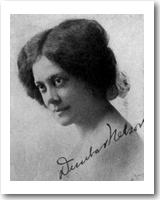Fembio Specials Famous Lesbians Alice Dunbar Nelson
Fembio Special: Famous Lesbians
Alice Dunbar Nelson

(Alice Ruth Moore [birth name] )
born on July 19, 1875 in New Orleans, United States
died on September 18, 1935 in Philadelphia, United States
American writer, teacher and activist
150th birthday on July 19, 2025
90th anniversary of her death on September 18, 2025
Biography
Dunbar Nelson was always fully engaged – as a writer, teacher, feminist, political activist, wife and lover.
She was born in 1875, the daughter of a seamstress and former slave. Her parents were of African-American, Native American and European descent. After high school, Alice completed a two-year teacher training program at Straight College, where she studied art, piano, and cello.
While teaching in New Orleans in 1895, she self-published her first book, a collection of 12 poems and 17 stories and sketches.
The poet Paul Laurence Dunbar read one of her poems in the newspaper and began corresponding with her. In one of her letters to him she wrote that “an independent, intelligent woman does not lose her ability to love when she pursues a profession.” She married Dunbar in 1898.
Her second book, The Goodness of St. Rocque and Other Stories, was published in 1899.
In 1902, she and Dunbar separated and for the next 18 years she was a very popular teacher at Howard High School in Wilmington, Delaware. Her mother, sister and four nieces moved in with her. In addition to teaching, she worked as a playwright, director, manager and editor of two anthologies.
Dunbar Nelson had many love affairs, with both women and men. In her diary, which some consider her most important work, she developed the idea of a network of lesbian African-American women.
Alice’s third marriage was in 1916 to Robert J. Nelson, a widower with two children. In 1920, she became co-editor of the Wilmington Advocate, a weekly newspaper published by her husband that advocated for black rights. Three years later, Alice's unique style – a combination of intellect, protest, racial pride, feminism and humor – found an even wider audience through a weekly column she wrote for the Washington Eagle. Dunbar Nelson seems to have held relatively conservative views on race issues, noting of Black writers that she was “not particularly fond of those writers who force the race problem and social justice into their narratives.”
Regardless of whether she was liberal or conservative, Alice Dunbar Nelson was always politically active. In her later years, she devoted herself more to humanitarian causes. In 1924, she co-founded the Delaware Vocational School for Black Girls; from 1928-31, she worked with the Quakers to win Blacks over to the cause of world peace.
Alice Dunbar Nelson died in her Philadelphia home in 1935 after a three-year bout with heart disease.
(Text from 1994; translated with DeepL.com; edited by Ramona Fararo, 2025.
Please consult the German version for additional information, pictures, sources, videos, and bibliography.)
Author: Sarah K. Horsley
Quotes
If I Had Known
If I had known
Two years ago how drear this life should be,
And crowd upon itself allstrangely sad,
Mayhap another song would burst from out my lips,
Overflowing with the happiness of future hopes;
Mayhap another throb than that of joy.
Have stirred my soul into its inmost depths,
If I had known.
If I had known,
Two years ago the impotence of love,
The vainness of a kiss, how barren a caress,
Mayhap my soul to higher things have soarn,
Nor clung to earthly loves and tender dreams,
But ever up aloft into the blue empyrean,
And there to master all the world of mind,
If I had known.
If you hold the rights to one or more of the images on this page and object to its/their appearance here, please contact Fembio.


